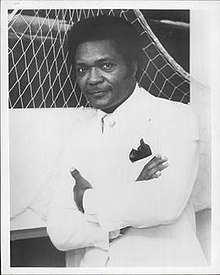Onzy Matthews
| Onzy Matthews | |
|---|---|

Onzy Matthews, 1976
|
|
| Background information | |
| Birth name | Onzy Durrett Matthews, Jr. |
| Born |
January 15, 1930 Fort Worth, Texas, US |
| Died | November 13, 1997 (aged 67) Dallas, Texas |
| Genres | Jazz, bebop, soul, R&B, hard bop, jazz fusion |
| Occupation(s) | Musician, composer, arranger, actor |
| Instruments | Piano, singer |
| Labels | |
| Associated acts | |
Onzy Durrett Matthews, Jr. (January 15, 1930 – November 13, 1997) was an American jazz pianist, singer, arranger and composer as well as a television and movie actor. He is best known for the big band arrangements done for the Lou Rawls albums Black and Blue and Tobacco Road, as well as arrangements for several of Ray Charles' 1960s releases. He had his own big band for many years and recorded numerous tracks for Capitol Records, including two albums released under his own name. He later had a close relationship with the Duke Ellington orchestra, working as a pianist, arranger and conductor through the late 1960s and 1970s.
Onzy Durrett Matthews, Jr. was born on January 15, 1930 to Onzy Matthews and Leola Jones in Fort Worth, Texas. He grew up in Dallas until his early teens when his mother moved to Los Angeles seeking better paying work. His early exposure to music was through singing in a church gospel choir.
Matthews knew early on he wanted to be a musician: "music was his calling." He graduated from high school early, at the age of 16, and primarily wanted to be a singer. "I taught myself to accompany myself on piano and then I found out you had to have arrangements." In the early 1950s he enrolled in the Westlake College of Music in Hollywood and studied voice, ear training and harmony; much like Berklee School of Music they were proponents of the Schillinger System. He auditioned for band leader Les Brown as an arranger; Brown helped Matthews focus on what to keep in an arrangement that works, and what to discard.
In 1959 Matthews contacted Dexter Gordon who was prominent in the Los Angeles jazz scene at the time. Matthews' first big band was started with the help of Gordon and fellow saxophonist Curtis Amy. The group started with a book of 21 charts from Matthews, and rehearsed on Wednesday nights for 5 months until they finally booked gigs in the area. The group was a conglomerate of all-star Los Angeles jazz/studio artists who immediately took a liking to playing Matthews' inventive, blues-based orchestrations; the first players coming through his band included Gordon, Amy, Sonny Criss, Jack Sheldon, Carmell Jones, and Red Mitchell. Curtis Amy included two of Matthews' original tunes on his Pacific Jazz LPs Meetin' Here and Way Down in 1961 and 1962 respectively. Dexter Gordon recorded Matthews' original tune "Very Saxily Yours" for his Gettin' Around LP on Blue Note Records, but the track was not released until 25 years later on the CD re-issue. Matthews became known around Los Angeles as an adept arranger and musical director; his first professional arranging assignments came at this time with Lionel Hampton, Della Reese, Ruth Price, and Gene McDaniels. The first tune of Matthews to be commercially recorded was in 1956, when clarinetist Maurice Meunier, who had played with Lionel Hampton, recorded in France. Meunier had got a copy of Matthews' Blues for the Reverend through his association with the Hampton band the year before.
...
Wikipedia
